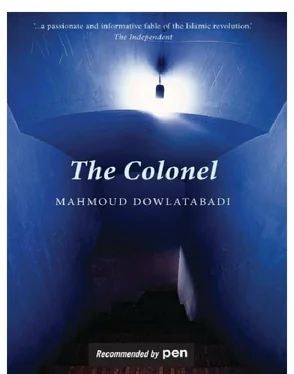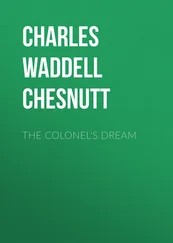
He wasn’t going to Qorbani’s house for two reasons. Firstly because, as one of those responsible for staging the great forthcoming event, Qorbani would have his work cut out with all the preparations, and a visit from his father-in-law would be even more unwelcome than usual. Secondly, Qorbani’s pick and shovel — that family have been grave diggers for generations — would come in more handy at the colonel’s house. So he should go straight home, and dry his clothes, dry his whole body and dry his bones. He felt that even the brain in his head had got soaked and that, if he did not dry it out, it might rot.
When he got home, he saw Amir squinting at him through the sitting-room window, his wide eyes looking like those of a sick owl. But the colonel’s most pressing need was to get rid of the pick and shovel and find the lavatory; he was bursting. Hopping round in circles holding his hands tight over his privates like an old buffoon, he recalled that most houses had their lavatories at the end of the yard, so why should his be any different? He ducked under the low roof in the corner of the yard and presently came out, feeling greatly relieved. The only thing weighing him down now was his clothing, which seemed to have absorbed a vast load of rainwater. He was chilled to the bone and felt that he had shrunk to the size of a rat. What a treat it would be if the paraffin had not run out and the stove were still burning. He then fell to speculating that, if Amir could only snap out of his nightmare for a moment, just this once, and if he could be bothered to do so, he would witness this absurd and ridiculous spectacle of his father. He would then be able to compare it with that other, similarly rainy night when he had been staring out of the same window into the courtyard, and the colonel had marched back in with his drawn sword still dripping with the warm blood of his wife’s heart, as if returning as a conquering hero from a great battle. His blood-charged sabre glinted in the dancing light of the never-ending rain, and the thought struck him that, by having been put to use on his wife, this weapon, which he had only ever worn on parades, had finally lost its historical pointlessness and found some real purpose. He was victorious; with his head erect and his shoulders back he marched up the steps into the room and, as he laid the sabre, still loaded with warm blood, down on the mantelpiece, right in front of The Colonel’s photograph, he stood to attention and declared, to no-one in particular: “I’m a soldier, a soldier am I, and let the whole world know it!”
But now, as he climbed the stairs, he looked like nothing so much as a condemned man. As he walked into the room, he could not bring himself to look at his son. Amir would not look at him either; his face looked as though it was framed behind the glass in the window. the colonel wanted nothing to do with him and dragged himself like a whipped dog to the stove, which still had a glimmer of heat in it, and began unbuttoning his clothes, which were all covered in muck and smelt of death and rotting flesh. As he did so, one baneful thought kept nagging at him, buzzing round his head like a fly: he wanted to ask Amir whether he had ever thought about his own death.
Amir’s finally emerging from his basement appeared to signal some change in his state of mind. Everything and anything seemed possible to the colonel, except that his son’s mental state might have improved. It meant he could only be heading for his death. It could also have been that the pressure of his never-ending nightmares had forced Amir out of his basement. The colonel remembered that Amir had once wanted to become an architect and had been fascinated by history.
Youth, youth… the fleeting moment of youth is like a school exercise book overwritten with correction marks; the forces that keep a young man going are his hope and his ambition. Sometimes a young man realises he cannot fulfil all his aspirations, but he won’t let that get him down. For instance, a young man who has decided to become a doctor or an engineer can go one of two ways: he can become a vague idealist who believes that he can go and eliminate hookworm from the south of the country, with its hot, foul climate or, if he can get through a course of road engineering, he might believe that he will be able to produce a comprehensive plan to improve the country’s road infrastructure. On the other hand, it is only those realists sitting on the benches in the university lecture halls who, right from the word go, imagine themselves actually owning a lucrative medical practice or running a construction company.
But no-one has the right to undermine or obstruct the hopes and aspirations of the young on the basis of one’s own experience. It is quite wrong to be a doom-monger. No, one should keep one’s peace and just nod one’s head in agreement. To launch young people on their way, one should provide them with all the space and opportunities that one can and then leave the rest up to them and up to luck. That is what I did for my children.
But when I ran into Amir in prison I saw that his views on life, on his education, on his course of studies and on his future and so forth had completely changed from what they had been a few years before. Without any logic, he had grown more embittered and yet at the same time more hopeful. Embittered by what he had had to go through in prison, yet still hopeful for the future of his country.
This may have been some sort of realism appearing in him, but his new realism was just as embittered as his old hopefulness had been so delightfully energetic, so when they let him out I was surprised by the sudden naïve, over-hasty optimism that had seized him, as if he were starting with a clean slate. Had he been swept along by the sudden wave of unrest, which had taken everyone by surprise? Yes, that must have been it. By the time he had come to his senses, the universities had been closed down and he found himself teaching history and design in a secondary school. I remember clearly that he showed no sign of concern when they closed the universities, and I even heard him say that this was the only way to root out the opposition groups! 30I can’t remember much in particular about him getting his first job, but I remember exactly the day when he lost it, as if it were engraved on my mind.
It was raining that day and it was exactly seventeen minutes past nine, and the colonel was sitting behind the steamed-up windows of Noqli’s teahouse, gazing out at the muddy pavement, when he saw Amir coming back from the school. Amir was walking along the pavement with his raincoat collar turned up and holding his old umbrella over his head. He slowed down in front of the teahouse and stopped. the colonel could see him, but through the steamed-up windows Amir could scarcely make out any of the customers in the smoke-filled room. ‘Perhaps he wanted to come in for tea and a cigarette,’ thought the colonel, but Amir changed his mind and carried on. the colonel decided that it was the thought of facing his father that had changed Amir’s mind, for of course Amir knew that Noqli’s teahouse was his father’s regular haunt. He even knew some of the regulars: one of the longest-standing was Kerbela’i 31Ramazan Kolahi, who was already losing his sight. He was usually to be found keeping warm beside Noqli’s big samovar, peering through his spectacles, which were as thick as the bottom of his tea glass.
It was not only the thought of finding his father in the teahouse that had made Amir change his mind. It was more likely to have been that, in his present mistrustful and listless state, he did not want to meet anyone at all. Whatever it might have been, Amir carried on past the teahouse and went home.
Читать дальше













